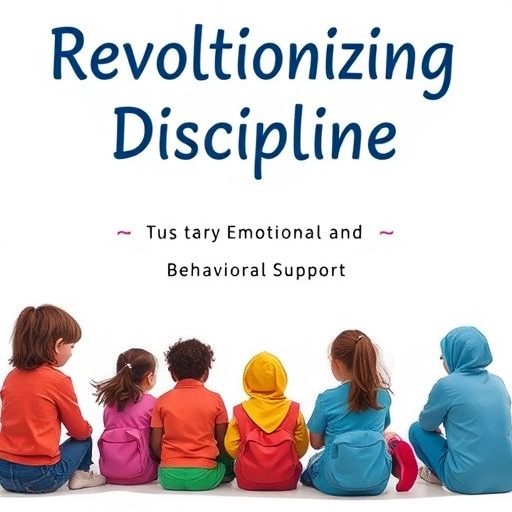In an era where educational equity is not just a goal but a necessary foundation for a just society, the paradigm of school discipline is under rigorous scrutiny. The publication titled “Equity-Focused Implementation Science: Strategies for Improving School Discipline Practices for Students with Emotional and Behavioral Disorders” by Selders, Holmes, and Estrapala, sheds light on crucial strategies aimed at refining school discipline practices specifically for students grappling with emotional and behavioral disorders. This 2025 research underscores the multifaceted approach necessary to attain equity in educational settings, highlighting the intersection of mental health and disciplinary practices.
School discipline practices have traditionally been criticized for systemic biases that often disproportionately affect students of color and those with disabilities. The research presents a vital discourse on implementation science to propose thoughtful, equity-focused alternatives that reshape the landscape of school discipline. One cannot overstate the significance of developing interventions that consider the diverse needs of students, especially those requiring additional support due to their unique emotional and behavioral challenges.
The research emphasizes that effective accountability structures are paramount within schools aiming to reform their disciplinary procedures. Without rigorous monitoring and evaluation frameworks, schools cannot truly measure the impact of their new strategies. The principles of implementation science highlight the importance of data-driven decision-making, which guarantees that the approaches taken are not only intended to work but are also demonstrably effective in yielding positive outcomes for students. The importance of adapting evidence-based practices cannot be overlooked, especially considering the varied cultural and socio-economic factors at play.
It is crucial to ensure that educators, administrators, and policymakers are thoroughly trained in these equity-focused methodologies. The professional development necessary for faculty members cannot be understated; teachers must be equipped not only with the skills to manage classroom behavior but also with the insight to understand the underlying issues that may lead to disruptive behaviors. Knowledge of emotional and behavioral disorders is essential to create a supportive environment in which all students can thrive. Therefore, continuous professional development and training should be integral components of these reform efforts.
Furthermore, the research calls attention to the need for partnerships between schools and mental health professionals. Collaborative efforts can significantly enhance the efficacy of interventions tailored for students with emotional and behavioral disorders. By forging these alliances, schools can provide comprehensive support that addresses both academic and psychological needs. The inclusion of mental health resources on campus reflects a progressive step towards destigmatizing emotional and behavioral challenges and provides students with the tools they require to succeed.
A vital component of equity-focused strategies also includes engaging families and communities in the discussions surrounding school discipline. The involvement of parents and caregivers is essential for fostering a supportive environment beyond school walls. By encouraging family participation, schools not only bridge gaps between home and educational settings but also empower families to advocate for their children effectively.
Moreover, the article highlights the potential benefits of restorative practices as an alternative to traditional punitive disciplinary measures. Restorative practices focus on repairing harm and building relationships rather than simply enforcing punitive consequences. This approach has shown promise in transforming the school climate, reducing re-offense rates, and enhancing students’ interpersonal skills. By centering the narrative on understanding and reconciliation, restorative practices can be instrumental in nurturing a sense of belonging and community among students.
The authors argue for the critical role of cultural responsiveness in crafting effective disciplinary interventions. An equity-focused framework necessitates an understanding of the cultural contexts of students’ lives and how these contexts intersect with their educational experiences. When interventions are culturally relevant and sensitive, they are more likely to resonate with students and yield meaningful change.
Additionally, the piece delineates strategies for assessing the impact of implemented disciplinary policies. Continuous assessment is essential to identify what works and what doesn’t. Schools must be willing to adapt their strategies based on feedback and outcomes, thereby committing to an ongoing cycle of improvement. With each iteration of their practices, schools can draw upon data to inform future iterations, leading to increasingly refined and effective interventions.
The implications of this research are far-reaching, marking a paradigm shift in the understanding of school discipline. It emphasizes that school discipline is not merely a series of reactive measures but should also be perceived as an integral part of a comprehensive educational framework that prioritizes student well-being as much as academic achievement. As educational institutions evolve to embrace such models, they pave the way for more equitable environments that nurture all learners, particularly those facing emotional and behavioral challenges.
In conclusion, the findings presented by Selders, Holmes, and Estrapala in their upcoming publication provide a blueprint for schools aiming to enhance their disciplinary practices. By engaging in equity-focused implementation science, schools can move beyond traditional punitive measures and foster environments where every student is valued and supported. The evolution of school discipline is not just a procedural change but a transformation in educational philosophy that brings mental health and equity to the forefront of our educational discourse.
The journey toward equitable education is ongoing, and research such as this provides the insights needed to undertake this critical social challenge. By integrating strategies grounded in implementation science, educational leaders can create systems that prioritize inclusivity, fairness, and the mental health of every student, ultimately leading to a brighter future for all within academic contexts.
Subject of Research: Strategies for Improving School Discipline Practices for Students with Emotional and Behavioral Disorders
Article Title: Equity-Focused Implementation Science: Strategies for Improving School Discipline Practices for Students with Emotional and Behavioral Disorders
Article References:
Selders, K.J., Holmes, S.R. & Estrapala, S. Equity-Focused Implementation Science: Strategies for Improving School Discipline Practices for Students with Emotional and Behavioral Disorders.
School Mental Health (2025). https://doi.org/10.1007/s12310-025-09826-2
Image Credits: AI Generated
DOI:
Keywords: Educational equity, school discipline, emotional and behavioral disorders, implementation science, restorative practices, cultural responsiveness.




